المراقبة والتقييم
لا تتعلق معظم تحديات الرصد والتقييم، مثل الافتقار إلى الاستثمار والقدرات الكافية، تحديدًا بالمساعدات النقدية والقسائم. لكن تلك التي تتعلق في المقام الأول برصد نتائج عمليات النقل غير المقيدة. ويمكن أن تجعل مرونة التحويلات النقدية من الصعب تحديد مؤشرات النتائج المناسبة، لأنها قد تتضمن مجموعة من المؤشرات القطاعية والشاملة. وفي الوقت نفسه، هناك قيود على جمع بيانات دقيقة حول كيفية إنفاق التحويلات النقدية.
التزم الموقعون على الصفقة الكبرى بضمان وجود آليات الرصد والتقييم ذات الصلة فيما يتعلق بالنقد، وزيادة فهم التكاليف والفوائد والآثار والمخاطر المتعلقة بالنقد بالنسبة للطرائق الأخرى. بناءً على ذلك، يحتوي مسار الصفقة الكبرى على نقاط عمل بما في ذلك تطوير مؤشرات نتائج مشتركة للمساعدات النقدية متعددة الأغراض، ومقاييس لتحليل القيمة مقابل المال. تم تقييد التحليل المنهجي للقيمة مقابل المال بسبب عوامل تشمل عدم وجود نهج متفق عليها، والحاجة إلى بيانات نتائج عالية الجودة، وطبيعة التحليل.
الأولويات الحالية
في إطار الالتزامات النقدية للصفقة الكبرى، شاركت شبكة CALP (مع الوكالة الأمريكية للتنمية الدولية وخدمات الإغاثة الكاثوليكية) في تطوير مؤشرات النتائج للمساعدات النقدية متعددة الأغراض. وتُتاح مسودة الاختبار حاليًا باللغات الإنجليزية والفرنسية والإسبانية عبر مكتبة شبكة CALP.
Related initiatives
Featured content

Multipurpose Cash Outcome Indicators – Final Draft for Testing
Guidelines and Tools
Note that the MPC indicators have now been revised. Please click here to access the updated Multipurpose Outcome Indicators and Guidance, which is available in Arabic, English, French and Spanish. Multipurpose Cash Outcome Indicators – Final Draft for Testing Multipurpose cash (MPC) is a type of assistance intended to enable people to meet their basic needs through local...

Monitoring 4 CTP: Monitoring Guidance for CTP in Emergencies
Guidelines and Tools
This guidance provides a central resource to promote a common understanding of the most important monitoring considerations for humanitarian projects using cash transfer programming (CTP). The primary audience for this guidance is field-level practitioners, from organisations directly involved in the design, implementation, monitoring, and accountability of projects using cash and vouchers...

Cost-Efficiency Analysis of Basic Needs Programs: Best Practice Guidance for Humanitarian Agencies
Guidelines and Tools
The Efficiency, Effectiveness and Value for Money Sub-Workstream is pleased to share the final output on Cost-Efficiency Analysis of Basic Needs Programs: Best Practice Guidance for Humanitarian Agencies (attached).
Cost-efficiency analysis estimates the ratio of program costs to outputs created, allowing you to compare cost-per-output for programs which all produced the same output. Such...
Thematic lead
Latest

Prepaid Card Products For Humanitarian Programs: Actors, Insights & Recommendations
Guidelines and Tools
Today, over 130 million people need humanitarian support to survive. Fortunately, new tools such as prepaid cards allow us to respond to these needs with increasing flexibility and efficiency. Today’s leading humanitarian agencies are increasing their use of prepaid cards in places like Jordan, the...
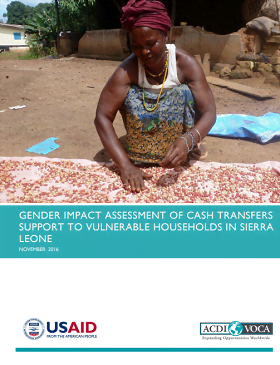
Gender impact assessment of cash transfers support to vulnerable households in Sierra Leone
Report
This report outlines the findings and recommendations from a qualitative assessment carried out to complement and further develop the findings from a recently concluded quantitative study of SNAP+ in order to better understand the driving factors behind behavior during the Ebola crises. The quantitative...
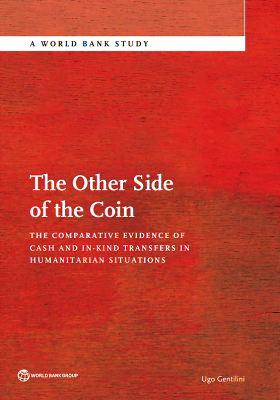
The Other Side of the Coin. The comparative evidence of Cash and in kind transfers in humanitarian situations
Report
This paper reviews the existing evidence on the performance of alternative transfer modalities across humanitarian sectors, including cash transfers, vouchers,and in-kind assistance (food and non-food). These were assessed in relation to food security, nutrition, livelihoods, health, education, and...
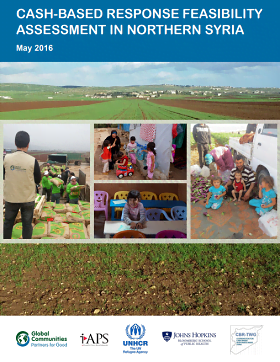
Cash-based Response Feasibility Assessment in Northern Syria
Case Study
As the conflict in Syria extends beyond the fourth year, there is need for a widespread humanitarian response focused on urban areas that addresses humanitarian needs and promotes resilience for the 13.5 million people in need of protection and humanitarian assistance within Syria. The majority of...
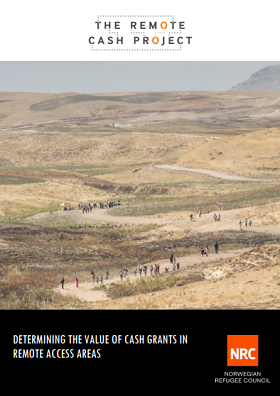
Determining the Value of Cash Grants in Remote Access Areas
Guidelines and Tools
This review aims to complement the work of NRC within the framework of the ECHO funded Remote Cash Project by providing a comparative analysis of different means of determining the size of cash grants, with the development of practical recommendations for approaches that can be used in hard to access...

Building on social protection systems for effective disaster response: the Philippines experience
Report
How can social protection systems be used in disasters, as a complement to, or substitute for, humanitarian assistance? Oxford Policy Management led a two-year research project investigating this question, looking at the role of social protection in both mitigating the impact of large-scale shocks and...

Labour Market Analysis in Humanitarian Contexts. A practitioner’s guide
Guidelines and Tools
The world and the scale of complex crises are rapidly changing, thus calling for new tools and fresh approaches. This guide aims to help humanitarians conduct better labour market analyses (LMA) to inform the design and delivery of livelihoods and market strengthening programmes in emergency crisis and...

Market Analysis and Outcome/Impact Measurement in Cash Transfer Programming in the WaSH and Shelter Sectors in Sudden Onset Disasters
Report
Over the past five years, cash transfer programming has become an increasingly popular modality of humanitarian intervention. Recently, unconditional and unrestricted MPGs have been increasingly championed as a default modality, based on evidence collected by organisations such as the...
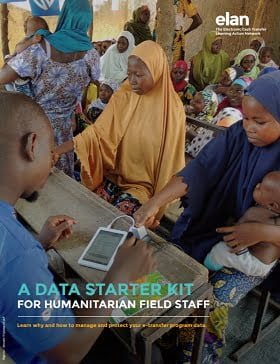
Data Starter Kit for Humanitarian Field Staff
Guidelines and Tools
A practical guide to help humanitarian field staff understand and manage data protection issues.

Afghanistan Emergency Response Mechanism (ERM)
Report
The Afghanistan Emergency Response Mechanism (ERM) was selected as a case study to illustrate the ‘alliance’ form of inter-agency collaboration for sector-focused cash assistance, with semi-formal relationships and separate funding flows between members. It is distinctive from other cases in that cash...
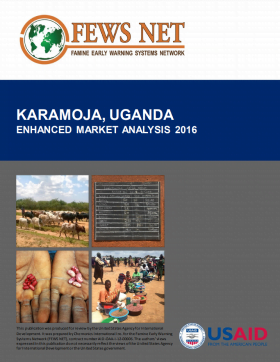
Karamoja, Uganda: Enhanced Market Analysis
Report
The Market Fundamentals reports serves as starting points for providing efficient and effective market-based response decision support for both emergency and development programs in Karamoja Region of Uganda. It examines the appropriateness and feasibility of modality response options for the region.

Cash transfers programming in the Pacific: A Feasibility Scoping Study
Report
The use of Cash Transfer Programming (CTP) to provide humanitarian assistance so that people may access the goods and services they need before, during and following a crisis has been gaining momentum over the past decade. Despite the considerable use of cash and vouchers by government and non-state...

Post Distribution Monitoring Report: Cash Based Interventions in Lebanon (Jan-March 2016)
Report
This post-monitoring report relies on several quantitative and qualitative approaches to evaluate the process, performance and impact of the cash based interventions (CBI) undertaken between January and March 2016, contrasting these with the results obtained in the post-distribution monitoring report...

The Revival of the “Cash versus Food” Debate: New Evidence for an Old Quandary?
Report
The longstanding “cash versus food” debate has received renewed attention in both research and practice. This paper reviews key issues shaping the debate and presents new evidence from randomized and quasi-experimental evaluations that deliberately compare cash and in-kind food transfers in ten...

Using Cash for Shelter: An Overview of CRS Programs
Report
Cash continues to gain prevalence as a modality for humanitarian agencies to help people meet multiple and diverse needs in the wake of a crisis. It provides people with the dignity of choice, and is often significantly more cost-efficient than the delivery of in-kind aid. In programs with a shelter...
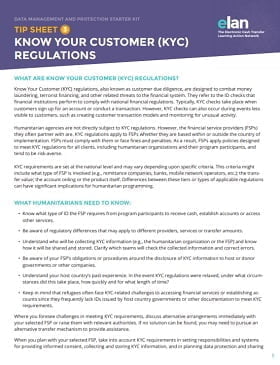
Data management and protection starter kit: Tip sheet 3: Know your customer (KYC) Regulations
Guidelines and Tools
Know Your Customer (KYC) regulations, also known as customer due diligence, are designed to combat money laundering, terrorist financing, and other related threats to the financial system. They refer to the ID checks that financial institutions perform to comply with national financial regulations....
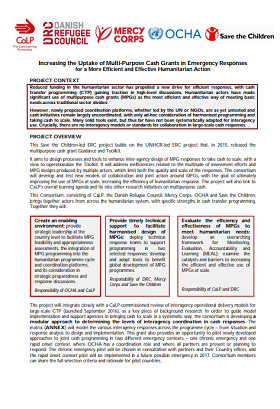
Increasing the Uptake of Multi-Purpose Cash Grants in Emergency Responses for a More Efficient and Effective Humanitarian Action
Report
Reduced funding in the humanitarian sector has propelled a new drive for efficient responses, with cash transfer programming (CTP) gaining traction in high-level discussions. Humanitarian actors have made significant use of multipurpose cash grants (MPGs) as the most efficient and effective way of meeting...
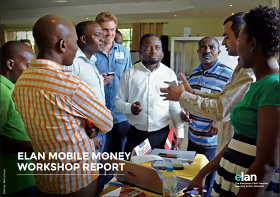
ELAN Mobile Money Workshop Report
Report
The Electronic Cash Transfer Learning Action Network (ELAN) hosted two mobile money workshops in January 2016 in Dakar (Senegal) and in Gisenyi (Rwanda). The workshops were attended by 52 individuals from seven countries across West Africa and the Great Lakes region representing 16...
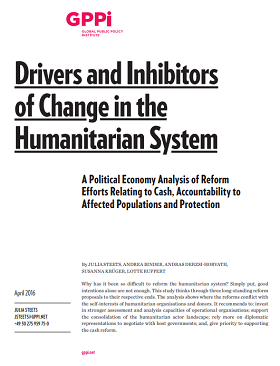
Drivers and Inhibitors of Change in the Humanitarian System
Report
This study analyses the drivers and inhibitors of change in the humanitarian system. It focuses on three reform efforts: cash-based emergency response, accountability to affected populations and protection. For each area, the study explores four questions to help explain why reforms are successful or...

Economic Impact of Refugee settlements in Uganda
Report
Uganda is home to close to 800,000 refugees, mostly from South Sudan, Burundi and the Democratic Republic of Congo. It also has one of the most favorable and progressive refugee assistance programs in the world, with freedom of movement, work rights, and land officially set aside for refugees to...
